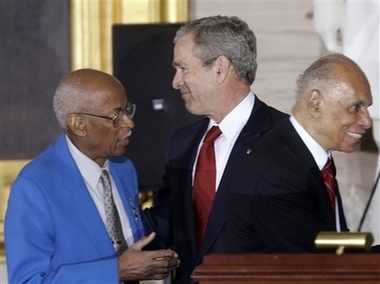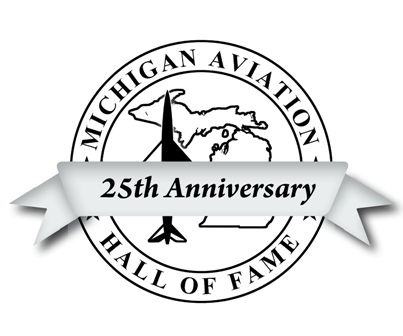By Sonya Bernard-Hollins, editor
editor@comvoicesonline.com
 KALAMAZOO/PORTAGE (MICH.)-People wanted to forget it. It was time to move on, start a career, and take care of family. It would be hard to forget what just happened, not long after April 29, 1945, when Gen. George S. Patton’s Third Army liberated Stalag Luft, Germany, World War II was over.
KALAMAZOO/PORTAGE (MICH.)-People wanted to forget it. It was time to move on, start a career, and take care of family. It would be hard to forget what just happened, not long after April 29, 1945, when Gen. George S. Patton’s Third Army liberated Stalag Luft, Germany, World War II was over.
Alexander Jefferson didn’t want to forget, but with a degree in chemistry and biology from Clark University he had to deal with the “today” of 1945. Jim Crow was still perched in the South, and the North had its racial issues as well.
“Before the war, I wanted to become a chemist, work in a lab,” said Jefferson, now age 86. “But when I came home to Detroit, I was told I was ‘over qualified.’ That’s what (Whites) said when you were a Black man with an education.”
 Jefferson never received the job he long studied for. He would become an elementary school science teacher and retire after more than 30 years. However, today Lt. Col. “Jeff” knows his country does remember and care that he and nearly 1,000 other Black men made history during WWII as the Tuskegee Airmen.
Jefferson never received the job he long studied for. He would become an elementary school science teacher and retire after more than 30 years. However, today Lt. Col. “Jeff” knows his country does remember and care that he and nearly 1,000 other Black men made history during WWII as the Tuskegee Airmen.
Jefferson along with other Tuskegee Airmen will be honored during the 2011 Michigan Aviation Hall of Fame (MAHF) enshrinees and award recipients on Saturday, May 21 at the Air Zoo in Portage, Mich. They will receive the Spirit Of Flight Award for their historic role as America’s first military airmen.
Cost to attend is $60 per person; ($35 of each ticket is a tax deductible gift, as allowed by law. Each ticket is good for an Air Zoo wristband package the entire day of the ceremony.) Entree choices are chicken, beef, salmon or a vegetarian dish. Business attire is suggested. At 6 p.m. cash bar and 6:30 p.m. dinner and program will begin.
According to the Air Zoo website: http://www.airzoo.org the Michigan Aviation Hall of Fame (MAHF) was established in 1987 to recognize men and women who have made significant contributions to aviation. It is located in the Air Zoo’s Main Campus.
To attend the awards event RSVP by May 16 to 269.350.2813 or email Sue Butters
Others to be recognized during the event include:
Clayton J. Brukner
Beaumont “Pard” Diver
Capt. Edward V. Rickenbacker
Lt. Gen. James E. Light Jr.
Capt. James L. Mynning
Col. Robert F. Warren
Nancy Lynn Mess
Jefferson presented the keynote address during the Kalamazoo Metropolitan NAACP’s 28th NAACP Freedom Fund Banquet in 2008. At that event the retired pilot, educator, and author, shared how becoming a Tuskegee Airman changed life for himself and generations to come.
He and other Tuskegee Airmen also were honored for their contributions to the country during the inauguration of President Barack Obama as they were seated on the platform during Obama’s swearing in ceremony.
The War
(*See PDF document for updates on Tuskegee Airmen today)
When the Draft was instituted, Jefferson like other Blacks dreaded the fact they would end up like many others before them, being military servants and hard laborers working for $21 a month. However, when military recruiters came to Black colleges to recruit pilots, Jefferson had hope.
“If we passed the test, after nine months we would become 2nd lieutenants, and earn $150 a month. We would be officers and pilots in the military. It was a dream come true,” he said.
He graduated from CU in June of 1942. Went home to Detroit to take the exam to become a pilot and passed. He went on to work toward a master’s degree at Howard University when he received the call in April of 1943 that would later make him one of the first 32 Black men to complete the Army Air Corps training at Tuskegee Army Airfield in Alabama. He would forever be a member of the 332nd Fighter Group, under. Col. Benjamin O. Davis, America’s first black general.
Their assignment was bittersweet, as it was seen as an experiment to prove blacks did not have the mental capacity to become pilots. However, after fighting valiantly in the war, and earning a reputation as saving their fellow pilots in their air, the mission to prove incapacity, failed. And when the base closed after the Tuskegee base closed in 1946, Jefferson saw it as a good thing.
“We were glad. We proved we could fly, and could now serve and train in an integrated military,” Jefferson said of Morton Field, which will become an historic site in October 2008.
Founding of Tuskegee Airmen, getting their just due
It would be more than 15 years after the war that Jefferson and other Black pilots who had trained in Tuskegee and now lived in Detroit, would unit to honor their past. Soon others who lived across the country would follow and in 1972 they would become a national incorporation and become forever known as the Tuskegee Airmen. It would be the pilots themselves that named themselves the Tuskegee Airman. Prior to that, they would simply just be known as black pilots according to Jefferson.
What they started calling themselves has led them to worldwide fame. Movies staring Laurence Fishburne, to statues being erected in their honor now hold help hold their place in history. They talk to kids across the country about their experiences and lead weekend flying opportunities and summer aviation programs. In 2007, they earned the Congressional Medal of Honor for their role in World War II. The medal was made possible through legislation by Sen. Carl Levin, D-Michigan, and Rep. Charles Rangel, D-New York.
Jefferson captured many of his memories in his memoir, “Red Tailed Captured, Red Tailed Free,” in 2004. He said what he, and others went through as a Tuskegee Airman helped catapult other Civil Rights Era changes.
